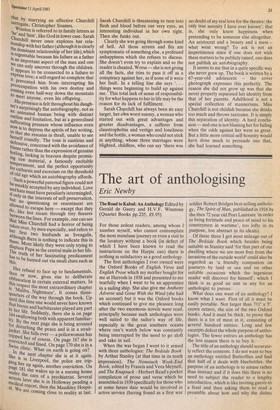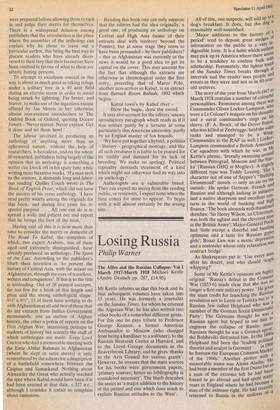The art of anthologising
Eric Newby
The Road to Kabul: An Anthology Edited by Gerald de Gaury and H.V.F. Winstone (Quartet Books pp.235, £9.95) For those ardent readers, among whom [number myself, who cannot contemplate the most mundane journey or even a visit to the lavatory without a book (in defect of 'which I have been known to read the instructions on the Harpic can) there is nothing as satisfactory as a good anthology.
The first anthologies I ever owned were the Oxford Books of English Verse and English Prose which my mother bought for me at Harrods in 1938 and presented to me tearfully when I went to be an apprentice in a sailing ship. She also give me Anthony Adverse and Gone With the Wind (she had an account) but it was the Oxford books which continued to give me pleasure long after the two enormous novels were read, principally because such anthologies were well suited to the sailor's way of life, especially in the great southern oceans where one's watch below was constantly being interrupted by the need to go aloft and take in sail.
When the war began I went to it armed with three anthologies: The Bedside Book by Arthur Stanley (at that time in its tenth impression), The Nonesuch Week-End Book, edited by Francis and Vera Meynell, and The Knapsack -Herbert Read's pocket compilation of prose and verse which he assembled in 1939 specifically for those who at some future date would be involved in active service (having found as a first war soldier Robert Bridges best-selling anthology, The Spirit of Man, publiished in 1916 by the then 72 year old Poet Laureate 'in order to bring fortitude and peace of mind to his countrymen in wartime', too lofty in its purpose, too abstract in its ideals).
Of these three I got Most mileage out of The Bedside Book which besides being suitable as Stanley said .'for that part of our dwelling where we are most free from the invasions of the outside world' could also be regarded as 'a friendly companion on journeys by land or sea and on other suitable .occasions which the ingenious reader will discover for himself', which I think is as good an aim as any for an anthologist to pursue.
What does one want of an anthology? I know what I want. First of all it must be easily portable. Not larger than 71/2" x 5", crown octavo, the size of the two Oxford books. And it must be thick, to prove that there is a lot of meat in it, consisting of several hundred entries. Long and few excerpts defeat the whole purpose of anthologies. The fewer entries an anthology has the less reason there is to buy it.
The title of an anthology should accurately reflect the contents. I do not want to buy an anthology entitled Butterflies and find that half of it deals with bluebottles. the purpose of an anthology is to amuse rather than instruct and if it does this there is no need to subject the reader to a lengthy introduction, which is like inviting guests to a feast and then asking them to read a preamble about how and why the dishes were prepared before allowing them to tuck in and judge their merits for themselves.
There is a widespread delusion among publishers that the introduction is the place where the assembler of the anthology can explain why he chose to leave out a particular author, this being the best way to placate readers who have already discovered to their fury that their favourites have been omitted in favour of what to them are utterly boring persons.
To attempt to exculpate oneself in this way is about as much good as taking refuge under a solitary tree in a 40 acre field during an electric storm in order to avoid being struck by lightning. Far better, and braver, to make use of the ingenious excuse offered by Jan Morris in her otherwise almost non-existent introduction to The Oxford Book of Oxford, quoting Doctor Jowett – 'Never retreat. Never explain. Get it done and let them howl,' The labour involved in producing an anthology of anything more than an ephemeral nature, without the help of researchers, is herculean, and on the whole ill-rewarded, publishers being largely ofthe opinion that an anthology is something a writer can knock off in his spare time while writing more lucrative works. `If a man seek to the sources, it demands long and laborous reading' Quiller Couch wrote in The Book of English Prove, which did not have the success of his verse anthology. `I have read pretty widely among the originals for this book and during five years for its special purpose . . . All one can do is to spread a wide and patient net and report that he brings the best of the haul.'
Having said all this it is now more than time to consider the merits or demerits of The Road To Kabul, the compilers of which, two expert Arabists, one of them aged and extremely distinguished, have already produced an anthology, The Spirit of the East. According to the publisher's blurb their intention is `to present the history of Central Asia, with the accent on Afghanistan, through the eyes of travellers, writers and conquerors'. If this is so the title is misleading. Out of 28 printed excerpts, far too few for a hook of this length and price and the wrong anthologiCal shape, 91/2" x 61/2", 15 of them have nothing to do with Afghanistan at all and two of those that do are extracts from Indian Government memoranda; one an outline of Afghan history, the other a précis of reports on the First Afghan War, interesting perhaps to students of history but scarcely the stuff of which anthologies are made. Even Lord Curzon who had a memorable meeting with the Emir Abdur Rahman in Afghanistan (where he _slept in satin sheets) is only remembered by the editors for a description of a battlefield somewhere between the Caspian and Samarkand. Nothing about Alexander the Great who actually reached the spot where Kabul would have been if it had been erected at that date, c.327 B.C., although I consider it unfair to complain about omissions. Reading this book one can only suppose that the editors had the idea originally, a good one, of producing an anthology on Central and High Asia (some of their extracts deal with territory beyond the Pamirs); but at some stage they seem to have been persuaded – by their publishers'? – that as Afghanistan was currently in the news it would be a good idea to get its capital on the cover. This may account for the fact that although the extracts are otherwise in chronological order the first entry, preceding that of Marco Polo, another non-arriver in Kabul, is an extract from Barrack Room Ballads, 1892 which begins Kabul town's by Kabul river – Blow the bugle, draw the sword.
It may also account for the editors' uneasy introductory paragraph which reads as if it was written partly by a lecturer at some particularly dim American university, partly by an English master of fox hounds.
`We have put together a hybrid, a politico – literary – geographical montage; and like all such creatures it is liable to be praised for its virility and damned for its lack of breeding. We make no apology. Political topicality demands treatment of a kind which might not otherwise find its way into an anthology.'
Anthologists are a vulnerable breed.
They can expect no mercy from the reading public, or reviewers. I expect none when the time comes for mine to appear. To begin with it will almost certainly be the wrong size.











































 Previous page
Previous page